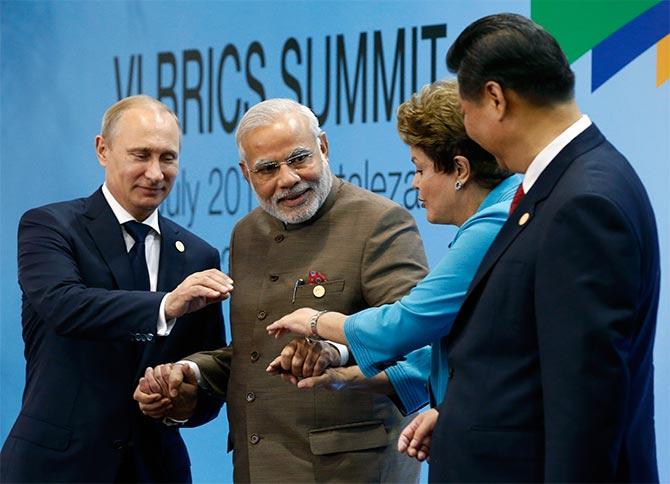 | « Back to article | Print this article |
 Modi knew in his heart that India does not have the financial muscle to support the new bank with offers of co-financing international projects, something China can do from the bank’s base in Shanghai. If established in Mumbai, it may have employed a few Indian bankers and satisfied the national ego but there was little financial value to be drawn from it.
Modi knew in his heart that India does not have the financial muscle to support the new bank with offers of co-financing international projects, something China can do from the bank’s base in Shanghai. If established in Mumbai, it may have employed a few Indian bankers and satisfied the national ego but there was little financial value to be drawn from it.
The emerging world has created a new development bank with some help from Prime Minister Narendra Modi, and there is justifiable cheering. But there are many who are asking if Mumbai has lost out to Shanghai in the race of becoming the headquarters of the $100 billion National Development Bank, as it is called.
Some analysts said Modi has been outsmarted by Chinese President Xi Jinping during negotiations at the BRICS summit in Brazil. Mumbai lost an opportunity to deploy some of its highly talented bankers in the Big Brother game of deciding the fate of international projects. Shanghai, which mostly imports talented bankers, won the race.
India’s Modi "has been outmaneuvered," CNN quoted Aditi Phadnis, South Asia advisor at Teneo Intelligence saying in a note. Is that really true or Modi managed to get something more in return for the headquarter venue?
It is important to understand the reason behind Xi’s desperation to have the new bank headquartered in Shanghai instead of allowing any other city relish the first fruit of the BRICS movement that started in 2009.
In today’s China, almost any strategy is worthwhile as long it defeats its rival Japan in some way. The one bank, which will face most competition from the NDB is the Asian Development Bank, which is controlled by Japan. Weakening the ADB can result in reducing Japan’s sphere of influence in Asia.
China harbours grave bitterness over atrocities committed by Japanese soldiers, though some say Beijing has hugely exaggerated the tales, during the World War II. It is also a rival competing for the Diaoyu Islands (Senkaku in Japanese) in the East China Sea, which is claimed by both countries.
Even more importantly, China has only recently overtaken Japan as the second largest world economy, and remains in constant fear that the Japanese economy might someday reclaim its old position.
Japan controls the ADB having supplied all its nine presidents since inception in 1966. Japan and its ally, the United States, jointly hold more 25 per cent share in the regional bank. China and India own less than 6 per cent each. It is natural for China to desire control over an international development institution, and the BRICS bank neatly meets that objective.
The creation of NDB also promises to seriously cripple the ADB, and thereby reduce Japan’s influence in Asia. India and China are the two biggest borrowers of the ADB. The new bank provides them with an alternative route of financing.
People in Shanghai routinely complain about being neglected in favour of the capital Beijing. Immediately after he took over as President, Xi assured business that he will reverse his predecessor, Hu Jintao’s programme of shifting investments away from Shanghai and Guangdong provinces to the relatively backward central and western regions. Establishing the NDB in Shanghai will help him placate the sentiments of the local people as well as give a boost to the newly created Shanghai Free Trade Zone.
Xi invited India to then next meeting of the Asia-Pacific Economic Cooperation, taking place in Beijing next November. Though this does not mean a membership of the 21-nation club, which is currently limited to Pacific Rim economies, the invitation suggests Beijing will back India’s decades-old request to join it.
The US and Japan have earlier indicated they are prepared to consider the request because of India’s special importance but APEC has been stalling even after the window for admitting new members opened in 2010.
Washington is bound to feel outsmarted, and begin to re-examine China’s capability to woo even difficult suitors. China had done something similar in 2011 when it used the venue of the BRICS meeting at its beach city of Sanya to admit South Africa as the fifth member two years after the club had become operational.
"This is an important invitation because this is the first time India has been invited to an APEC meeting," Syed Akbaruddin, spokesman of India’s ministry of external affairs said in New Delhi. “We think this is a significant gesture”.
Though this does not mean a membership as this will have to be approved by APEC’s council, it is an important start. This is something the US should have offered India but it is China which is making the first move.
On his part, Modi struck to his guns, so to say, demanding detailed discussion on the India-China border problem instead of being enamoured by financial discussion about the new bank. This is what forced Xi to offer a negotiated settlement of the border dispute.
Modi knew in his heart that India does not have the financial muscle to support the new bank with offers of co-financing international projects, something China can do from the bank’s base in Shanghai. If established in Mumbai, it may have employed a few Indian bankers and satisfied the national ego but there was little financial value to be drawn from it.